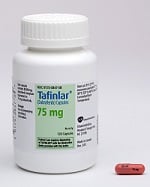
Britain's drug price watchdog, the National Institute for Health and Care Excellence (NICE), has given the go-ahead to GlaxoSmithKline's ($GSK) Tafinlar, which is among the new class of melanoma drugs that target tumor mutations. Not surprisingly, though, there's a catch: GSK must provide the drug at an undisclosed discount, according to NICE's guidance document announcing the decision.
Tafinlar targets a gene mutation known as BRAF, an approach to fighting melanoma that's similar to that taken by Roche's ($RHHBY) Zelboraf, which NICE gave the thumbs-up to in late 2012--also with an undisclosed discount. Tafinlar (dabrafenib) has a list price of £1,400 ($2,280) for 28 capsules, which constitutes a two-week course, according to Reuters.
The task of marketing Tafinlar will soon transfer over to Novartis ($NVS), which acquired it as part of a $16 billion deal with GSK. Novartis will also acquire another targeted melanoma treatment from GSK, Mekinist (trametinib), which has been approved by the FDA to be used in combination with Tafinlar.
Offering pricey cancer drugs at a discount to Britain's National Health Service is pretty much par for the course in winning NICE's blessing. The agency initially turned down Zelboraf (vemurafenib), not once but twice, despite additional cost effectiveness data provided by Roche. The drug at the time had a list price of about $2,700 a week.
More recently, NICE has come down hard on Bristol-Myers Squibb's ($BMY) melanoma immunotherapy drug, Yervoy (ipilimumab). The agency approved it in 2012, again with an undisclosed discount, but then came back this past February and said access to the drug should be limited to clinical trial patients or those who failed other treatments. The company appealed, as did physicians and patients, prompting NICE to do a U-turn in June and recommend the drug as a first-line treatment.
Physicians in the U.K. are applauding NICE's approval of Tafinlar. "Its approval underlines the importance of a new generation of cancer drugs targeted at specific molecular features of [tumors]--drugs which after years of painstaking development are now making their way to patients," said Paul Workman, interim chief executive of London's Institute of Cancer Research, in an interview with the BBC.
Just how far Novartis will be willing to press its luck in Europe with pricey cancer drugs remains to be seen, however. In March, the European Medicines Agency asked for more data on the Tafinlar-Mekinist combo treatment, prompting GSK to withdraw its application for approval.
- access the NICE guidance document here
- read more at Reuters
- here's the BBC's take